Key takeaways:
- Children’s music influences are shaped by exposure to various genres, aiding in emotional expression and creativity.
- Rhythm enhances learning by improving memory retention, coordination, and fostering a sense of community among children.
- Drumming develops motor skills, social skills, and important life skills like discipline and teamwork through collaborative activities.
- Engaging in drumming allows children to explore creativity, embrace imperfection, and build confidence through experimentation.
Understanding children’s music influences
Children’s music influences stem from a variety of sources, often intertwined with their everyday experiences. I remember my own childhood, where a simple nursery rhyme could transform a mundane car ride into an adventurous sing-along. Isn’t it fascinating how a catchy melody can create joyful memories and make learning feel effortless?
As kids absorb diverse musical styles from parents, school, or even media, they cultivate their unique tastes. I recently observed my niece dancing to a hip-hop beat, reminiscent of her enthusiasm for rhythm; it made me realize that exposure to different genres allows children to express themselves in varied ways. What if we encouraged them to explore even more styles, fostering their creativity and emotional connection to music?
The emotional depth of music for children cannot be underestimated. I recall a moment where my nephew, after a rough day, found solace in a calming lullaby. This demonstrates that music is not merely a form of entertainment; it can serve as a vital emotional outlet, helping children process their feelings. How might this awareness shape the way we introduce music to kids?
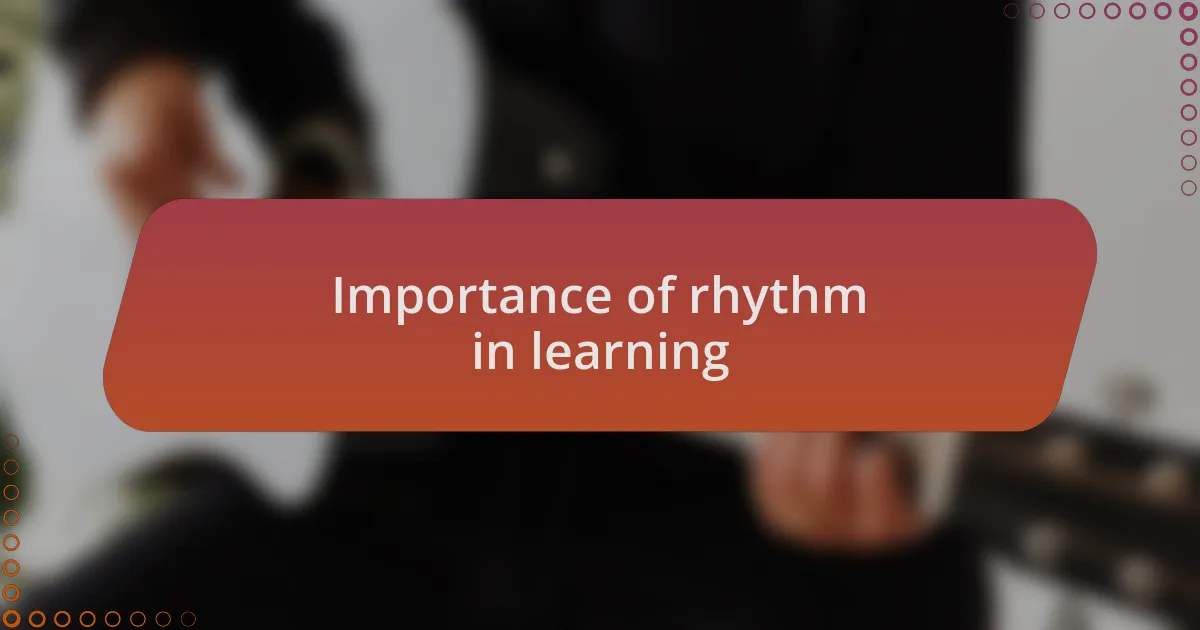
Importance of rhythm in learning
Rhythm plays a crucial role in learning, particularly for children, as it helps to organize information and can enhance memory retention. I still remember how my drumming instructor emphasized the importance of keeping time; it wasn’t just about music, but about creating a structure that made learning feel more manageable. Have you ever noticed how children naturally respond to rhythmic patterns when reciting nursery rhymes or clapping along to songs? This connection makes learning not just effective, but also fun.
Engaging with rhythm can also improve coordination and cognitive skills. I often watched my friends in music class, struggling at first with clapping to a beat, but over time, they became more confident in their movements. This progression is a powerful reminder that rhythm can be a gateway to developing discipline and focus. How might these skills translate into other areas, like academics or sports? From my experience, children who grasp rhythmic concepts often excel in tasks that require timing and precision.
Furthermore, incorporating rhythm into everyday learning can enhance emotional expression. I recall a time when we used drumming to signal transitions in a classroom setting; it not only captured students’ attention but also released their built-up energy. Isn’t it remarkable how rhythmic activities can create a sense of community among children? It fosters connections, not just with the material they learn, but with their peers, reinforcing the idea that learning is a collaborative process.
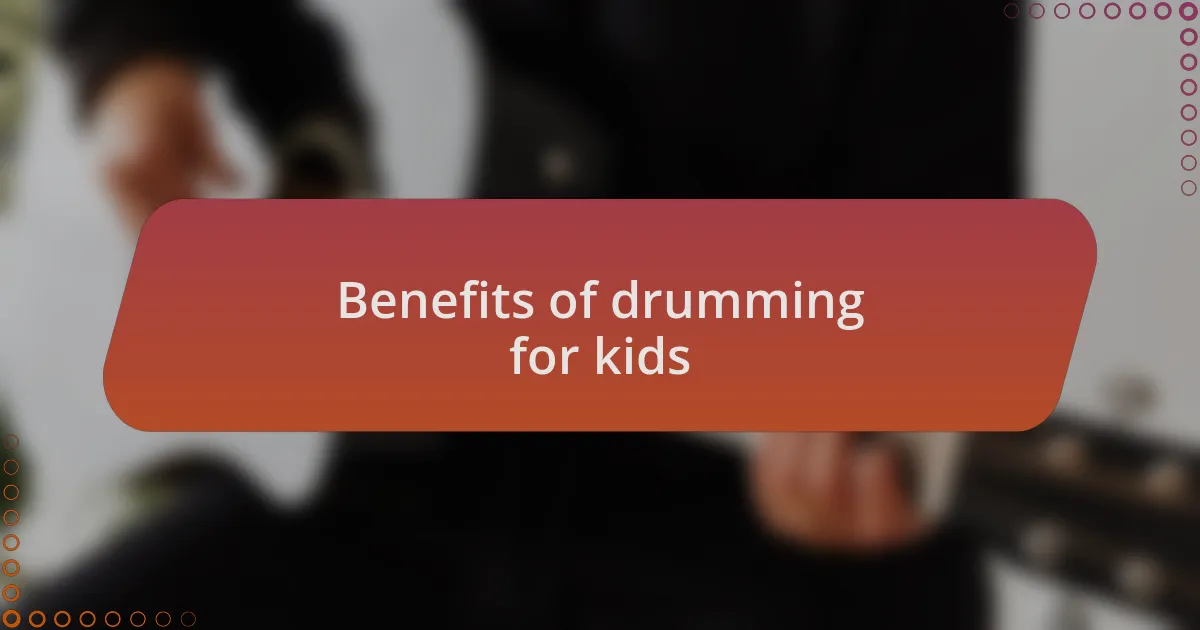
Benefits of drumming for kids
Drumming offers countless benefits to children, one of the most significant being the enhancement of motor skills. I remember teaching my little cousin how to play simple rhythms on a drum. At first, her hands would fumble, but after a few sessions, she could not only keep time but also coordinate her limbs independently. Isn’t it fascinating how a seemingly simple act can lead to such improvement in a child’s physical coordination and confidence?
Moreover, drumming can serve as a powerful outlet for emotional expression. During one of our group drumming sessions at school, I witnessed timid kids transform as they found their rhythm. The energy in the room shifted when they each took turns leading the beat. Can you imagine how empowering it must feel for children to have a way to express themselves that goes beyond words? It’s an incredible reminder of music’s capacity to connect us and give voice to our feelings.
Finally, drumming together fosters social skills among kids. I recall how my drumming circle taught us the value of listening and collaboration. There was an unspoken rule: to create harmony, everyone needed to be in sync. This experience beautifully illustrated that teamwork goes hand in hand with music, and what better way to show kids that cooperation can be joyful? Don’t you think it’s essential for children to learn these life skills early on?
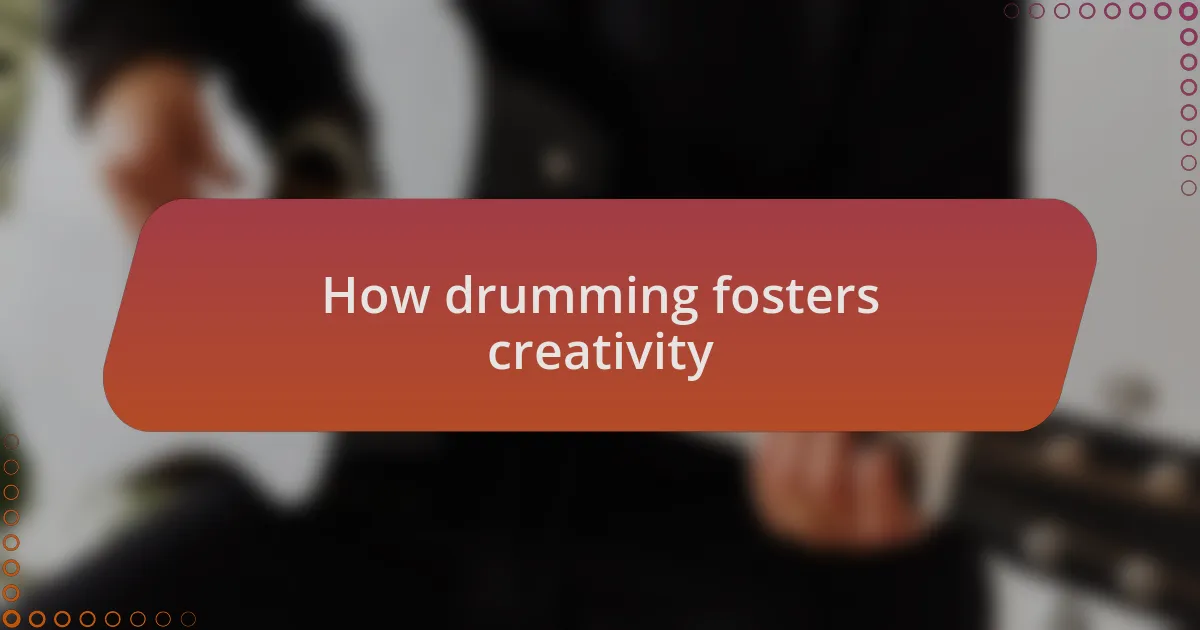
How drumming fosters creativity
Drumming is a unique way for children to explore their creative sides. I recall a time when I encouraged some kids to create their own beats from scratch. Watching them experiment with different patterns and sounds was inspiring. It was as if they were painting a picture with rhythm, allowing them to unlock their imaginations in ways they never thought possible. Isn’t it amazing how a simple drum can become a canvas for creativity?
Moreover, drumming challenges children to think outside the box. I remember one particularly curious child who began combining beats from various genres; their enthusiasm was contagious. This type of experimentation not only nurtures their artistic expression but also cultivates problem-solving skills as they figure out how to blend different elements seamlessly. Can you see how embracing this kind of creative challenge can boost their confidence in other areas of life?
Finally, there’s something intrinsically freeing about drumming that encourages kids to let go of perfection. I once observed a group of children who initially focused on playing the right notes but soon began to improvise, laughing through their mistakes. This shift showcased the beauty of creativity itself—embracing imperfection leads to unexpected surprises and joyous experiences. How often do we adults forget that playfulness is a vital part of the creative process?
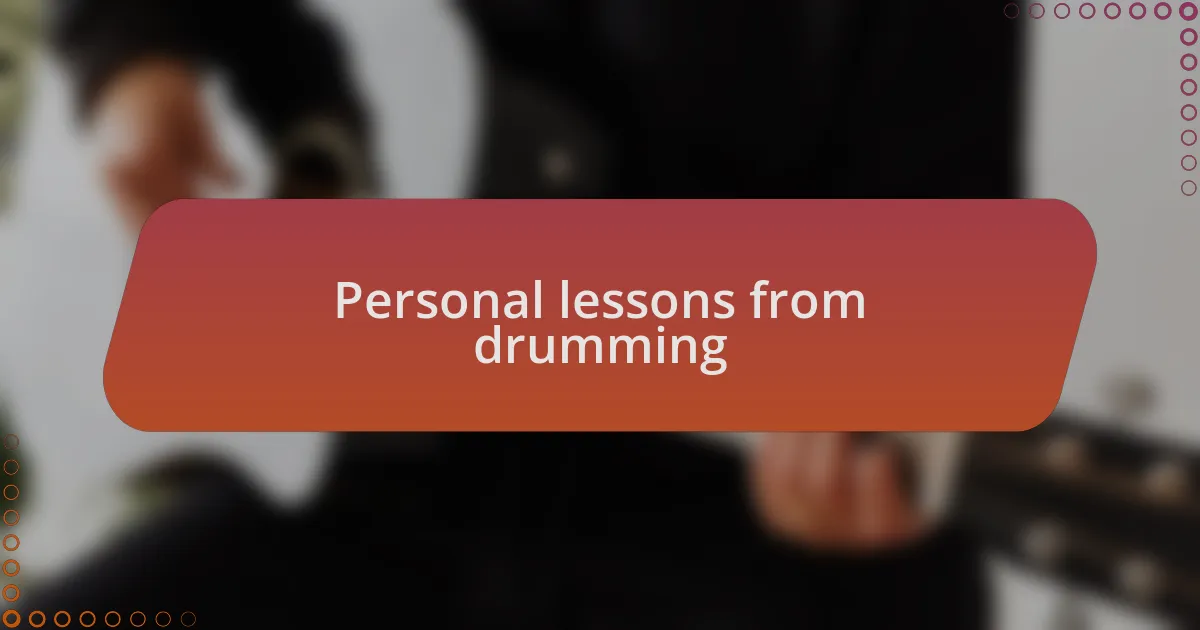
Personal lessons from drumming
Drumming has taught me the importance of discipline in a fun and engaging way. I remember my first drum lesson; the rhythmic patterns challenged my coordination and focus. Each time I missed a beat, I felt a little frustrated, but that quickly transformed into determination. Have you ever felt that moment when practice begins to pay off? It’s incredibly rewarding to witness growth through consistent effort.
Furthermore, I’ve learned that drumming deepens my connection with others. When I play in a group, there’s an unspoken communication that flows between us. I can’t forget the palpable energy during a jam session where everyone was synced in perfect harmony. Isn’t it fascinating how music transcends words, allowing us to express our emotions collectively?
Lastly, drumming has opened my eyes to the power of rhythm in everyday life. I often catch myself tapping a beat while waiting in line or listening to music, transforming mundane moments into a rhythmical experience. It’s a reminder that life can be like a drum, full of ups and downs, and finding your unique beat makes all the difference. Don’t you think we should all embrace that rhythm, no matter where we are?
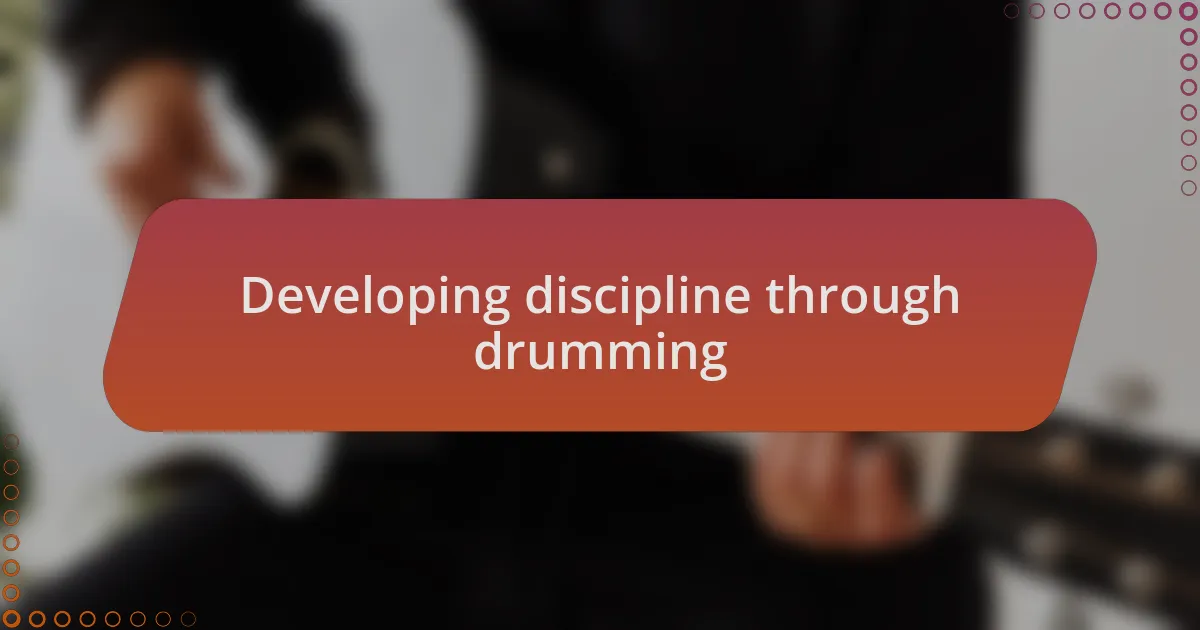
Developing discipline through drumming
There’s something about the repetition of drum practice that instills a sense of discipline in me. I vividly recall days where I’d sit with my metronome, pushing through the same exercises over and over. Each tick-tock of the metronome reminded me that progress comes from persistence, even when I felt like giving up. Have you ever noticed how sticking to a routine can lead to unexpected rewards?
As I progressed, the structured practice sessions became a vital part of my day. The discipline I developed on the drum set translated to other aspects of my life, from studying to managing my time. I often think back to those early days and realize that practicing patience and persistence behind the drums was a foundational step toward achieving goals beyond music. Isn’t it fascinating how mastering rhythms can shape our daily rhythms?
Ultimately, drumming is more than just striking a surface; it’s about commitment and self-regulation. I remember the first time I played a piece flawlessly in front of friends. That thrill of accomplishment made all those hours worth it, reinforcing my belief that discipline is a key ingredient for achieving any success. How do you think the act of mastering an instrument can influence your own sense of discipline?